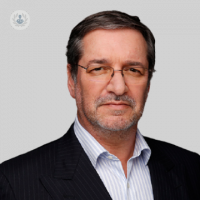How is depression and feeling suicidal treated at The OAD Clinic?
Escrito por:If you’re looking to seek professional help when it comes to treating your depression and any feelings of suicide, you may not know where to start or what can be expected from a treatment program.
Fortunately, we have spoken to the Clinical Director of The OAD Clinic in London, Dr Oscar D’Agnone, who very kindly explains how his clinic of highly-experienced psychiatrists, psychologists and counsellors can help provide you with your own tailored treatment plan in order to recover.

What are the different types of depression?
When depression is not related to any other mental or physical condition it is called primary depression.
When it is related or caused by another physical or mental condition, it is called secondary depression, or reactive depression.
Reactive depression is a reaction to an event (mental or physical). It can be the loss of a dear one or a physical disease for example.
Reactive depression is considered normal as long as it lasts for a certain period of time. In fact, we would consider abnormal some reacting with no emotion to the death of a dear one.
However, in some cases, reactive depression can trigger a more serious episode of major depression. This happens in cases where patients were prone to suffer depression, and the event only triggered something that was so to speak “latent”.
Secondary depression related to other conditions like alcohol dependence, drug use, chronic physical diseases, or other similar conditions, tend to improve when the primary condition does.
In some cases, depression is preceded or followed by hypomanic (exalted mood, hyperactive, insomnia, fast speech) or maniac symptoms (similar but to a psychotic level). We used to call those patients manic depressive patients, but now we call them bipolar disorder. They require special treatment usually involving inpatient admission.
How is clinical depression treated at The OAD Clinic?
The treatment of depression and the outcomes depend on the type of depression.
Most mild to moderate cases of depression, reactive depression and stress-related depression, are treated with a combination of medication and psychotherapy. Patients may need to take antidepressants like citalopram, fluoxetine or sertraline to treat depression and anxiety for a few months.
At the same time, they will also need therapy sessions to gain insight of their emotional life, and the way they deal with stress. If moderate cases do not improve within three months, for example, a more intensive approach is needed.
An increase in the medication dose or eventually a change of medication can be needed. Also, more frequent therapy sessions will be also needed to improve insight, but also for monitoring progress.
How do you care for patients with suicidal-tendencies?
From the very beginning, we always assess and monitor self-harm and suicidal ideation as part of our clinical risk assessment.
When these are present, we discuss with the patient and the family the best way to support the patient and manage those ideas, preventing them from turning into action (suicidal attempt).
We have a friendly but open discussion about these issues because this could be a reason for admission if there is not enough family support to prevent a suicidal attempt.
At this point, patients are usually on higher doses of antidepressants and, in some cases, sedatives or hypnotics as well.
When persistent insomnia with suicidal ideation or plans appears, admission to a mental health facility with expertise in dealing with patients going through such difficult times is needed.
Patients with a history of hypomania or bipolar disorder will also need a mood stabilizer to prevent a sudden switch to the opposite side of the disease. All of these interventions are available at the OAD clinic.
What can a patient expect with the treatment process at The OAD clinic?
We are a kind of boutique clinic offering a cosy, friendly, confidential and professional approach.
Initially, we always do a comprehensive clinical and risk assessment to fully understand where the patient is at this moment and what will happen next with or without treatment.
We have a well-experienced team of consultant psychiatrists, psychologists and counsellors who can provide both medical and psychological interventions.
This is essential for patients because all of the interventions are provided by one team, integrating resources and pulling in the same direction.
The patients and their families do not have to deal with different teams, ideas or strategies.
The OAD clinic will offer an integrated view and clinical strategy, with one point of contact available to help whenever is needed. We also have admission privileges to the most important clinics in central London should hospitalisation be needed.
Read more on the symptoms of depression.
The OAD Clinic is waiting for your call today if you’re struggling with depression. Do not hesitate to book an appointment to see Dr D’Agnone via his Top Doctor’s Profile.



